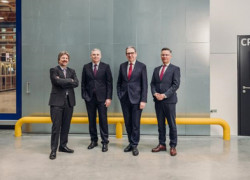CERATIZIT unveils the first Product Carbon Footprint standard for cemented carbide
CERATIZIT, a Plansee Group company, will introduce the first standard for calculating and classifying the CO2 footprint of carbide products at EMO Hanover 2023, the world's leading trade fair for production technology. In combination with a scoring and classification system, the Luxembourg-based carbide specialists promise an increase in transparency with carbon footprint at a product level and encourage other players in the carbide industry to take part.
"Our goal is to establish a common standard on the market for calculating and classifying the carbon footprint of cutting tools, hard material solutions and tungsten carbide powders. In this way, we will be able to provide customers the carbon footprint transparency they require," explains Executive Board Spokesman Dr Andreas Lackner. Similar to the scoring systems for electrical devices, motor vehicles and food, customers should be able to know and assess a product’s footprint with a single glance. The alphabetic PCF classification (Product Carbon Footprint) can be added to any product sheet or sales document. Over the coming months, CERATIZIT will roll out the PCF classification across its product portfolio, introduce related products and services and encourage customers, partners and other industrial players to adopt the newly developed standard.
Corporate carbon footprint as a prerequisite
Serving as the basis for the PCF calculation is the respective Corporate Carbon Footprint (CCF), i.e., the CO2 footprint of the entire company. In accordance with
the ISO 14067:2018 standard, the PCF includes not only the emissions attributable to Scopes 1 and 2, but also the upstream part of Scope 3 emissions, which can be allocated to specific products (purchased goods and services, upstream transportation and distribution, as well as waste generated from operations). To add extra emphasis on customer needs, CERATIZIT uses the cradle-to-gate approach and excludes downstream emissions.
Thanks to a fully integrated supply chain for raw materials, CERATIZIT is able to determine precise data for the PCF. “Our ambition is to lead the carbide industry into a sustainable future. However, it is up to customers to decide whether to opt for a standard product with detailed PCF transparency or a solution with a particularly low CO2 footprint. With our standard, we offer the basis for making informed decisions with ease,” says Dr Andreas Lackner.
Recycled premium grades for rods and wood working
For customers seeking to actively reduce the PCF in their own product range, the carbide grades of the upGRADE range from CERATIZIT provide effective and innovative solutions available for immediate use. The CT-GS20Y grade for rods for cutting tools and the KLC20+ grade for wood working are both produced from more than 99% strictly selected secondary raw materials and combine premium performance with a particularly low PCF, which is on average around 60% below the PCF of corresponding standard CERATIZIT grades.
Communiqués liés
Des investissements importants pour un avenir solide
Malgré une demande en baisse sur certains marchés de vente, le Plansee Group a...
EcoVadis Gold rating for Plansee, Silver for CERATIZIT
Certification awarded for global corporate sustainability measures.
Nouvelles répartitions des tâches au sein du Directoire de...
CERATIZIT a réorganisé les responsabilités au sein du Directoire à partir du...
Prix de l'Environnement pour les produits upGRADE de CERATIZ...
CERATIZIT a reçu le Prix de l'Environnement 2023 de la Fédération de l'indust...
CERATIZIT launches the first PCF standard for cemented carbi...
On the occasion of EMO 2023 in Hanover, CERATIZIT, has kicked off the introducti...
CERATIZIT acquires Xceliron Corp.
CERATIZIT S.A., part of the Plansee Group, has acquired all shares of Xceliron C...
Il n'y a aucun résultat pour votre recherche







